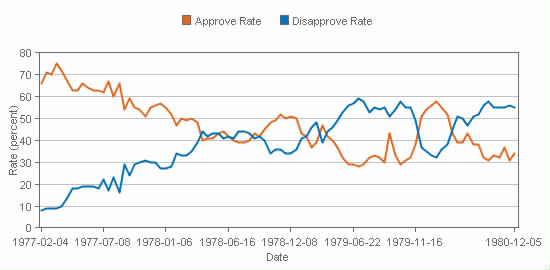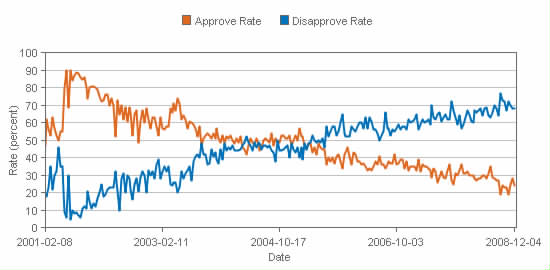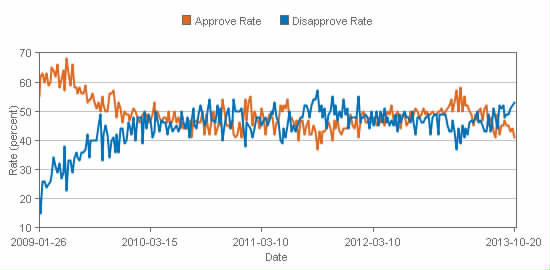The Lessons from the Shutdown Series examines the costs and consequences of the recent shutdown and debt ceiling fights. Elaine Kamarck argues that President Obama, like his predecessors, has fallen victim to management problems and overcoming those issues is necessary for salvaging the policy agenda.
What lessons can we learn about the presidency from the post-shutdown health care roll-out that has consumed the last part of October? One stands out – Presidents get elected because of leadership; they succeed because of management. In the end, management failures end up hurting a Presidents’ ability to lead.
Let’s start with President Carter. His first and only term was plagued by missteps and a bad economy. Even so he went into his re-election campaign on a high and in January of 1980 it wasn’t at all clear that the right-wing Governor from the State of California – Ronald Reagan – would beat him. And then, on April 24, 1980 a military operation to rescue American hostages in Iran suffered a spectacular and humiliating failure. Lack of coordination, training, preparation and the absence of a coherent command structure were just a few of the managerial failures that led to the crash of a helicopter into a C-130 transport plane in the middle of a desert sandstorm. Several American servicemen were killed and the mission aborted. As the following graph illustrates, President Carter’s approval ratings sank into the 30s starting in mid-May of 1980 as the public absorbed the enormity of the failure. And, he never recovered – losing in a landslide to Ronald Reagan seven months later.
Source: University of Connecticut, Roper Center
President George W. Bush was a bit luckier. His massive management disaster occurred in his second term. When, on August 29, 2005, a category five hurricane struck New Orleans, the botched federal response riveted the nation for weeks. Heart wrenching photos of people trapped on roofs or in the massive convention center made the U.S. look like a third world country. Repeated missteps and a tangled bureaucratic response on the part of the Federal Emergency Management Agency (FEMA) dominated the news for weeks – during which time President Bush’s apparent endorsement of the hapless leader of that Agency made him look even more out of touch with the operations of his government. As the following chart shows, Bush’ approval ratings took a sharp dive in September of 2005 and they never recovered. In fact, from then on through the remainder of his term he never again gets to even a fifty percent approval rating and his second term agenda, from privatization of social security to immigration reform, is doomed. Of course, increasing disenchantment with the Iraq War (another mission the public viewed as a managerial nightmare) also contributed to this slide – but the inflection point was Katrina.

Source: University of Connecticut, Roper Center
For Carter and Bush, their managerial failures shine light on the common myth in American politics that governors have the executive experience needed to be president. Between them, they served 10 years as governors of Georgia and Texas, administering large state bureaucracies. Despite that experience, both seriously mismanaged critical agencies and events, and paid the political price.

Source: University of Connecticut, Roper Center
And so we come to President Obama and the ill-fated rollout of his signature piece of legislation, the Affordable Care Act. Computer problems continue to make front page news and leaders of the effort have been grilled in front of Congressional Committees. As the story of what happened unfolds it appears to have all the hallmarks of a management failure: an unclear command structure, insufficient testing, and a failure to anticipate what large scale demand would do to a new and untested system. While Obama’s approval ratings have taken a hit in the past few weeks, he’s not into Carter or Bush territory yet. Jeff Zients, a talented former management consultant and former Deputy OMB Director has been brought in to fix the problems. (Frankly, had Zients been fully in charge from the beginning this would probably not have happened.) If he can really fix them by the end of November, Obama has a chance at salvaging his second term. But if other ACA implementation stories continue to dominate, such as recent stories about people losing their health care plans in apparent contradiction to the President’s reassurances that this would not happen, the ACA rollout has the potential to turn into the kind of management catastrophe that dooms the remainder of a president’s term.
The Brookings Institution is committed to quality, independence, and impact.
We are supported by a diverse array of funders. In line with our values and policies, each Brookings publication represents the sole views of its author(s).






Commentary
Lessons from the Shutdown: Management Matters, Even for Presidents
November 1, 2013